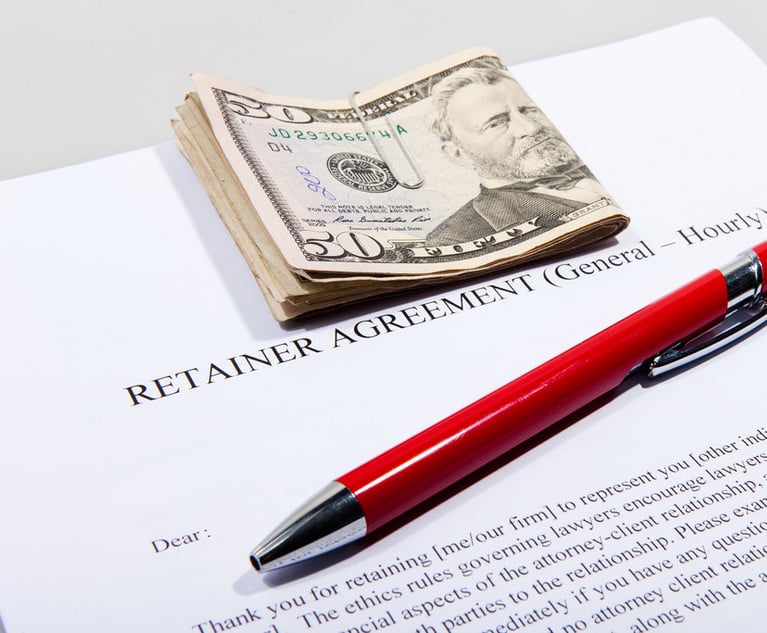Surviving COVID-19: Considerations for Selling Select Business Assets
Certain assets are vital to remain in compliance with applicable laws. Can the business continue to provide its products and services without the use of such assets in accordance with applicable laws?
July 06, 2020 at 11:15 AM
5 minute read
 Erica Optiz, Chamberlain Hrdlicka, Atlanta. (Courtesy photo: Jennifer Blount)
Erica Optiz, Chamberlain Hrdlicka, Atlanta. (Courtesy photo: Jennifer Blount)
The world is currently in unprecedented territory with the COVID-19 pandemic. Although most states have relaxed their requirements for reopening businesses, many are facing the repercussions of the mandated shutdowns and the fact that many businesses have not returned to "normal." As a result, business owners may try to address their current liquidity concerns by selling select assets to increase liquidity and reduce costs. Selling assets however is not a viable option for all businesses, so the first step is determining whether the business has eligible assets that can be sold.
Steps to Determine Whether Businesses Have Eligible Assets
First, the owner should consider the costs required to maintain, in the short and long term, all assets compared with the potential financial benefits of selling the assets. Are there any assets that have a high cost, especially in the short term, that could be sold for a profit?
Second, business owners should determine how taking those assets out of their business will impact their operations and ability to service existing customer obligations on a broad basis consistent with their company's mission. If selling an asset would have a detrimental impact on the services or products that the business provides their customers, then it may not be a viable option for their business. For instance, a business that provides "green" services or products to its customers would not want to sell the assets that allow them to fulfill their environmental mission, regardless of the cost of maintaining or the profit from selling such assets.
Finally, once business owners have a list of assets that may be eligible for sale, it is important to determine whether there are any other impediments to the sale, including the following:
Third party consent to the sale of certain assets may be necessary. Consent provisions can be in any type of contract but will often appear in an agreement that results in a lien against the asset or a contract where the asset is vital to the service or product being received or provided, such as loan agreements, purchase money promissory notes, customer contracts, or vendor contracts.
The business owner should ensure that the sale of these assets does not result in the business becoming technically insolvent, i.e. having a negative net asset value, or subject to creditor claims in bankruptcy proceedings, i.e. for fraudulent conveyance or other types of claims. Technical insolvency could result in an event of default under the business's contracts, especially loan agreements, and result in acceleration of debts owed.
Depending on the type of asset being sold, the tax consequences of the sale could vary so business owners should obtain advice from their tax advisers.
Certain assets are vital to remain in compliance with applicable laws. Can the business continue to provide its products and services without the use of such assets in accordance with applicable laws? For instance, some assets may be necessary to legally dispose of hazardous waste and failure to maintain such assets could result in heavy fines or personal liability under environmental laws.
Assemble the Right Team
Once business owners have identified eligible assets, they should assemble an experienced deal team, including legal, tax, accounting professionals and marketing professionals, to support them with the sale of those assets. They will assist with developing a marketing strategy for the sale as well as a communications plan to discuss the impact of the sale on the employees and customers of the business. In order to maximize the sales price for the assets, it is important to not only find the correct buyer, but to strike the right tone so as not to diminish negotiating power. If a buyer finds that the seller needs to sell the assets so the business can survive, it will ultimately affect the purchase price and other terms surrounding the sale. Furthermore, unless a communication plan is developed to explain why the sale will not have a negative impact on how the company does business, business owners may lose valued employees or customers.
Additionally, business owners should assemble their team early enough in the process to gather all relevant due diligence and address any issues that may be raised by a potential purchaser, such as title to the assets. By addressing these issues prior to the buyer becoming aware of them, business owners will not only expedite the deal process but avoid conversations that could damage buyer confidence in the assets.
Determine Whether a Sale is the Best Way to Go
Regardless of the analysis of the above issues, it is most important that business owners always come back to their company's mission and whether the sale of these assets compromise their vision or the commitments that they have made to their team and customers. If it will, then ultimately the sale of select assets is not a viable option to increase the business's liquidity during the pandemic and its aftermath and other avenues should be explored.
Erica Opitz is a shareholder in Chamberlain Hrdlicka's Atlanta office in the Corporate, Securities, and Finance practice group. Often serving as a client's outside general counsel, Opitz assists clients with corporate governance, commercial contract, mergers and acquisitions and privately held securities matters.
This content has been archived. It is available through our partners, LexisNexis® and Bloomberg Law.
To view this content, please continue to their sites.
Not a Lexis Subscriber?
Subscribe Now
Not a Bloomberg Law Subscriber?
Subscribe Now
NOT FOR REPRINT
© 2025 ALM Global, LLC, All Rights Reserved. Request academic re-use from www.copyright.com. All other uses, submit a request to [email protected]. For more information visit Asset & Logo Licensing.
You Might Like
View All
On The Move: Energy Infrastructure Pro Joins Moore & Van Allen, Adams & Reese Changes Atlanta Leadership
6 minute read
40% Contingency: A New Ruling Just Cost This Plaintiff Team $827K in Legal Fees
6 minute read

'David and Goliath' Dispute Between Software Developers Ends in $24M Settlement
Law Firms Mentioned
Trending Stories
- 1'It's Not Going to Be Pretty': PayPal, Capital One Face Novel Class Actions Over 'Poaching' Commissions Owed Influencers
- 211th Circuit Rejects Trump's Emergency Request as DOJ Prepares to Release Special Counsel's Final Report
- 3Supreme Court Takes Up Challenge to ACA Task Force
- 4'Tragedy of Unspeakable Proportions:' Could Edison, DWP, Face Lawsuits Over LA Wildfires?
- 5Meta Pulls Plug on DEI Programs
Who Got The Work
Michael G. Bongiorno, Andrew Scott Dulberg and Elizabeth E. Driscoll from Wilmer Cutler Pickering Hale and Dorr have stepped in to represent Symbotic Inc., an A.I.-enabled technology platform that focuses on increasing supply chain efficiency, and other defendants in a pending shareholder derivative lawsuit. The case, filed Oct. 2 in Massachusetts District Court by the Brown Law Firm on behalf of Stephen Austen, accuses certain officers and directors of misleading investors in regard to Symbotic's potential for margin growth by failing to disclose that the company was not equipped to timely deploy its systems or manage expenses through project delays. The case, assigned to U.S. District Judge Nathaniel M. Gorton, is 1:24-cv-12522, Austen v. Cohen et al.
Who Got The Work
Edmund Polubinski and Marie Killmond of Davis Polk & Wardwell have entered appearances for data platform software development company MongoDB and other defendants in a pending shareholder derivative lawsuit. The action, filed Oct. 7 in New York Southern District Court by the Brown Law Firm, accuses the company's directors and/or officers of falsely expressing confidence in the company’s restructuring of its sales incentive plan and downplaying the severity of decreases in its upfront commitments. The case is 1:24-cv-07594, Roy v. Ittycheria et al.
Who Got The Work
Amy O. Bruchs and Kurt F. Ellison of Michael Best & Friedrich have entered appearances for Epic Systems Corp. in a pending employment discrimination lawsuit. The suit was filed Sept. 7 in Wisconsin Western District Court by Levine Eisberner LLC and Siri & Glimstad on behalf of a project manager who claims that he was wrongfully terminated after applying for a religious exemption to the defendant's COVID-19 vaccine mandate. The case, assigned to U.S. Magistrate Judge Anita Marie Boor, is 3:24-cv-00630, Secker, Nathan v. Epic Systems Corporation.
Who Got The Work
David X. Sullivan, Thomas J. Finn and Gregory A. Hall from McCarter & English have entered appearances for Sunrun Installation Services in a pending civil rights lawsuit. The complaint was filed Sept. 4 in Connecticut District Court by attorney Robert M. Berke on behalf of former employee George Edward Steins, who was arrested and charged with employing an unregistered home improvement salesperson. The complaint alleges that had Sunrun informed the Connecticut Department of Consumer Protection that the plaintiff's employment had ended in 2017 and that he no longer held Sunrun's home improvement contractor license, he would not have been hit with charges, which were dismissed in May 2024. The case, assigned to U.S. District Judge Jeffrey A. Meyer, is 3:24-cv-01423, Steins v. Sunrun, Inc. et al.
Who Got The Work
Greenberg Traurig shareholder Joshua L. Raskin has entered an appearance for boohoo.com UK Ltd. in a pending patent infringement lawsuit. The suit, filed Sept. 3 in Texas Eastern District Court by Rozier Hardt McDonough on behalf of Alto Dynamics, asserts five patents related to an online shopping platform. The case, assigned to U.S. District Judge Rodney Gilstrap, is 2:24-cv-00719, Alto Dynamics, LLC v. boohoo.com UK Limited.
Featured Firms
Law Offices of Gary Martin Hays & Associates, P.C.
(470) 294-1674
Law Offices of Mark E. Salomone
(857) 444-6468
Smith & Hassler
(713) 739-1250






